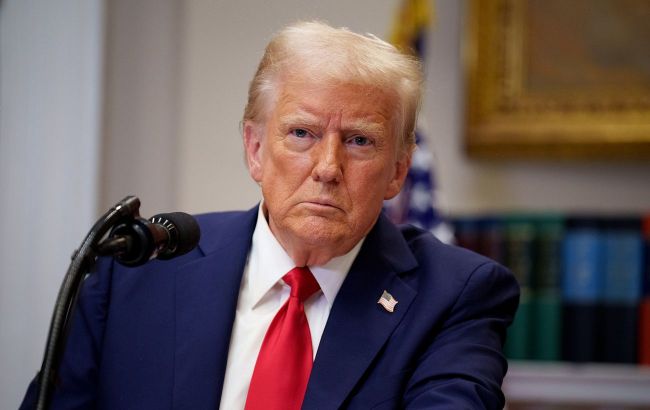US wants to send deported migrants to Ukraine - WP
 Photo: US President Donald Trump (Getty Images)
Photo: US President Donald Trump (Getty Images)
Amid Russia's full-scale invasion of Ukraine, Washington offered to host foreign nationals deported from the United States in Ukraine, The Washington Post reports.
In early 2025, the administration of US President Donald Trump called on the Ukrainian government to accept an unspecified number of third-country nationals deported from the United States.
According to the documents obtained by the agency, the proposal was submitted in late January by a high-ranking American diplomat. The proposal was about accommodating foreign nationals on the territory of Ukraine, despite Russia's full-scale invasion and the lack of functioning airports due to constant rocket attacks.
According to the documents, a representative of the Ukrainian side informed the US Embassy that the government would respond after formulating its position. The documents do not specify what exactly the reaction of official Kyiv is. Similar proposals were also sent to other countries.
According to the agency, Ukraine has not accepted any foreigners deported from the United States, and there is no reason to believe that Kyiv considered this initiative seriously. Two Ukrainian officials, speaking on condition of anonymity, said that the issue was not discussed at the government level. One of them said he was not aware of any US political demands on the issue.
The State Department emphasized that ongoing engagement with foreign governments is key to countering illegal migration and securing America's borders. At the same time, the department forwarded inquiries about the content of the offer to Ukraine to the US Department of Homeland Security (DHS), which did not comment.
Subtle blackmail by Washington
Documents reviewed by WP indicate the Trump administration's intention to expand deportation policy on a large scale, involving new mechanisms. The materials, dated January-May, state that the administration has been trying to increase the number of countries willing to accept deported third parties, in particular by providing incentives or promises of improved relations with the United States.
For example, many Latin American countries, including El Salvador, Mexico, Costa Rica, and Panama, have agreed to accept non-citizens. In El Salvador, for example, with the government's consent, President Nayeba Buchele received an invitation to the White House, and his administration allocated millions of dollars to house deportees in prisons.
In some cases, such as Panama, the US administration, according to sources, threatened economic restrictions, including tariffs or even a review of the status of the Panama Canal.
Yael Schacher, director of the Americas and Europe at Refugees International, noted that the Trump administration was likely to focus on governments seeking Washington's favor or in difficulty. In her opinion, the scale of American efforts in this area is unprecedented. According to her, it is not only the number of agreements that is striking, but also their irregular nature, the logic of reciprocity, and financing.
Even before the 2024 elections, Trump had repeatedly expressed his readiness to use Ukraine's dependence on American military aid to put pressure on Kyiv. After he took office in January 2025, the rhetoric intensified.
Tensions, according to sources, peaked in February during Trump's conversation with Ukrainian President Volodymyr Zelenskyy in the Oval Office. A partial easing of tensions became possible after Kyiv agreed to some of the US demands, including access to Ukraine's critical mineral resources.
Transit points
Some negotiations concerned the use of third countries as transit points. Thus, in conversations with Uzbekistan in early March, the possibility of using the country as a logistics base for the deportation of Russian and Belarusian citizens in the absence of air traffic due to the war in Ukraine was considered.
A document prepared by the US government states that the Uzbek representative did not deny this possibility. Instead, the American side offered many incentives, including a phone call or a personal meeting between the leaders of the countries to reach an agreement.
Deportation of migrants from United States
After taking office in January this year, US President Donald Trump and his administration began mass deportations of migrants from the country.
To legitimize this action, the White House is trying to use the Alien Tort Statute of 1798.
In early April, the US authorities introduced daily fines for those migrants who did not leave the country after a court order.
In addition, the Trump administration has launched a self-deportation program. According to the program, those migrants who voluntarily leave the United States will receive a free ticket and monetary compensation.

